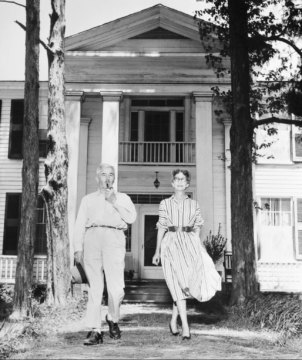by Deanna Kreisel [Doctor Waffle Blog]
 The other day, over cigarettes and beer, my friend M. told me the story of the Ghost Cop of Rowan Oak. She was speaking from authority, as she had just encountered it a few days before. Her boyfriend P. was there—both at Rowan Oak and on my front porch with the cigarettes and the beer—and it was nice to watch them swing on the swing and finish each other’s sentences.
The other day, over cigarettes and beer, my friend M. told me the story of the Ghost Cop of Rowan Oak. She was speaking from authority, as she had just encountered it a few days before. Her boyfriend P. was there—both at Rowan Oak and on my front porch with the cigarettes and the beer—and it was nice to watch them swing on the swing and finish each other’s sentences.
It had all started innocently enough: the two of them had decided to take their dogs C. and Z.[1] on a late-night stroll through M.’s neighborhood, which happens to contain a large antebellum estate known as Rowan Oak. For the benefit of the 99.999% of this publication’s readers who do not live in Oxford, Mississippi: this particular large antebellum estate was home to William Faulkner from 1930 to the time of his death. For the benefit of the 0.001% of this publication’s readers who do not know who that is: William Faulkner was one of the greatest American novelists of the twentieth century, an early practitioner of the subgenre that came to be known as “Southern Gothic,” and a lifelong resident of Oxford who wrote about the town and surrounding area (fictionalized as “Yoknapatawpha County”) in 16 novels and over 50 short stories.
So M. and P. were strolling the other night with her tiny adorable dog and his larger adorable dog, enjoying the delicious bosky springtime air, when they made the fateful decision to extend their walk to the grounds of Faulkner’s estate. They were chatting away when they passed the invisible property line, at which point they were immediately assaulted by a brilliant search light splitting the darkness. A disembodied voice—they couldn’t see the speaker, since he hovered in the dark behind the light—demanded to know what they were doing on the grounds of the estate, which was closed for the night. [N.B. there was no Hours of Operation indication at the time, although a brand-new sign has since mysteriously appeared right on that spot.] M. and P. apologized profusely and were backing away from the bright light in their eyes when the voice went on: “You know, there are a lot of good reasons not to walk around this place at night. I mean … I’ve heard stories.”
P. was pretty sure he wanted to get out of there immediately, but M. was now intrigued. “Oh? Like what?” Read more »
